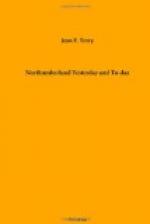Surrey meantime had gathered a large force from the northern counties, much to James’ surprise, for he had taken it for granted that nearly every English fighting man would be with Henry in Flanders. There were bowmen and billmen from Cheshire and Lancashire under the Stanley banner; and James Stanley, Bishop of Ely, brought the banner of St. Etheldreda, the Northumbrian queen who founded the monastery of Ely. Admiral Sir Thomas Howard brought a band of sailors to join his father at Alnwick. Dacre came with a strong contingent from the western Marches, men from Alston Moor, Gilsland, and Eskdale, and also some from Tynemouth and Bamburgh; and Sir Brian Tunstall with Sir William Bulmer led the men of the Bishopric under the banner of St. Cuthbert.
From Alnwick Surrey sent a letter pledging himself to meet James by September 9th, and challenging him to battle, a challenge which was promptly accepted by the Scottish king. Marching from Alnwick towards the Scottish army, Surrey encamped on September 6th on Wooler Haughs. James had formed his camp on Flodden Hill, and all Surrey’s devices could not induce him abandon this strong position. Many of his own nobles advised him not to risk a battle, but to withdraw while there was yet time; and some were ready to leave the camp and return home, which thousands of the more undisciplined in his army had done already, being more anxious to carry off their plunder safely than to stay and fight. But James was eager for the contest, and felt himself bound in honour to give battle to Surrey; he answered haughtily those who counselled retreat, and scornfully told Archibald Douglas, Earl of Angus, that he might go home if he were afraid. The old man sorrowfully left the field, but his two sons remained with their rash but gallant king, and were both slain.
On the day before the battle took place, Surrey, that “auld crooked carle,” as James called him, marched his men northward across the Till and encamped for the night near Barmoor Wood. To the Scots this looked as though they had gone off towards Berwick, to repeat James’ own manoeuvre, and invade the country in the absence of its king; and they must have thought that there would be little chance of the battle for which James had punctiliously waited taking place on the morrow. But Surrey’s purpose proved to be quite otherwise. On the following morning he sent the vanguard of his army, with the artillery, to make a detour of several miles round by Twizell bridge, where they re-crossed to the south bank of the Till; and coming south-eastward towards Flodden, they were joined by the rest of the army, which had plunged through the stream, swollen by continuous rains, at two points near Crookham. The two divisions met at Branxton, after having waded through a marsh which extended from Branxton nearly to the Till, and which the Scots had thought impassable.
Seeing that the English were about to occupy Branxton Hill, which would entirely cut him off from communication with Scotland, James was forced to abandon his advantageous position; he gave orders for the camp-refuse to be fired, and under cover of the dense clouds of smoke marched down to forestall Surrey and occupy Branxton ridge. The two armies suddenly found themselves within a few spears’ length of each other, and the battle was begun by the artillery on both sides.




